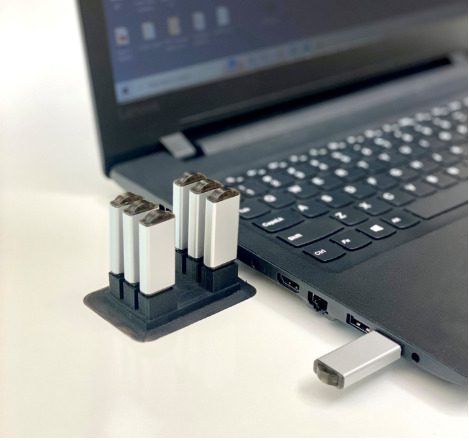The goal of the Health Insurance Portability and Accountability Act (HIPAA), which was passed into law in 1996 by the government of the United States of America, is to modernize the flow of healthcare information as well as how personally identifiable information is handled by healthcare providers and the patients they serve.
The protected health information, or PHI, of a patient is required by law to be stored at a location that is both safe and secure. This location may be located either online or offline. It is the responsibility of the healthcare practitioner to make every effort to meet the individual’s requested format, which may either be in the form of an electronic file or a paper copy of the information.
The Secure Disk offered by Nexcopy is a HIPAA-compliant USB flash drive that enables medical professionals to provide their patients with a safe and encrypted USB flash drive that contains their patients’ Protected Health Information (PHI).
The information about a patient is encrypted and stored in a concealed digital partition using Secure Disk technology. This partition is protected by a password that the patient chooses for themselves. When connected to a computer, the hidden partition is completely hidden from view and is unavailable to anybody and everyone. Only once the correct password is entered will the hidden partition become active and only then will the digital health information be shown.
The Secure Disk’s hidden partition is managed by the USB hardware chipset, which may be found on the USB stick itself. The solution to the security problem is not software but rather hardware, and it offers the highest possible level of protection that a technical product is capable of providing.
It became more important that medical records for patients be kept in a secure environment as medical professionals began to rely more heavily on electronic records and many other technologies to store and monitor patient information. As a direct consequence of this need, the central government of the United States created legislation to provide these safeguards. The Health Insurance Portability and Accountability Act is the product of those laws being passed into law (HIPAA). Nexcopy analyzed the offline storage options available on the market and discovered that there is not an easy, low-tech, or user-friendly technique to adequately save this information. The Secure Disk technology was developed by Nexcopy with these three aspects in mind from the beginning. The following describes each of the three components:
Simple: The device is always accompanied by some sort of protective technology.
Low Technology: To use the product, you do not need to have any user credentials or cloud storage. This is an independent solution that may be used offline.
User Friendly: The login procedure has been simplified because Nexcopy is aware that non-technical users would be using the application.
The USB flash drive that complies with HIPAA standards provides an unparalleled level of security for private medical records. A flash drive that uses the Secure Disk format is compatible with Microsoft Windows (Windows 7 and later). Apple and Linux are not supported as operating systems at this time (in development).
It is difficult for a user to inadvertently access the hidden partition because the hidden partition is automatically enabled when the USB is removed from the computer. This prevents the user from accidentally leaving the hidden partition open. Another option available to the User is to log out of the Secure Disk even while it is still connected to the host computer.
Why Is It Critical For Healthcare Providers To Comply With HIPAA Regulations?
If a healthcare provider violates HIPAA regulations, the company might suffer serious repercussions, including financial penalties and the possibility of losing its eligibility for federal financing. These companies should always comply with HIPAA to avoid being fined. HIPAA compliance refers to the process that must be followed by covered organizations to maintain and safeguard the healthcare data, also known as Protected Health Information, of a patient.
The violations that are caused by negligence on the part of the organizational staff are by far the most common. The goal would be to lessen the likelihood of such personnel making mistakes of a fundamental kind. The company protects itself from cyberattacks, data breaches, and the unsecured sharing of protected health information (PHI) by mandating that its employees use a secure disk for any patient information that is to be transferred.
Takeaway
The Health Insurance Portability and Accountability Act of 1996 (HIPAA) was created as a method to ensure the confidentiality and privacy of a patient’s Protected Health Information (PHI). When you use Nexcopy’s HIPAA-compliant USB flash drive, both the risks you face and the amount of exposure you have been reduced. It would appear that Nexcopy possesses the most advanced device for securely storing protected health information in an offline environment.



































